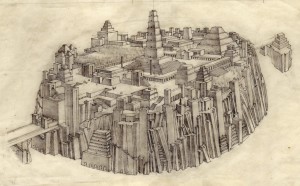The primary source for the legend of the lost city of Atlantis is Critias, a dialogue by Plato dating to around 360 BCE. The text is unclear whether Atlantis was a real nation, destroyed in a natural disaster, or an allegory intended to teach a lesson. The dialogue was either left unfinished or the ending has been lost, leaving the story incomplete. A brief summary of the Atlantis legend also appears in Timaeus, a companion dialogue by Plato, which tells of the downfall of the island continent. Critias appears to suggest that Zues and the other gods bore some responsibility for the destruction of Atlantis, but the text is cut off before their part is revealed.
In ancient times, the gods divided the whole earth among themselves. At this time, there was an island continent in the Atlantic Ocean, beyond the Pillars of Heracles, called Atlantis, which Poseidon received for his allotment. In the center of the island was a fertile plain, said to have been the fairest of all plains and very fertile. Near the plain was a small mountain, upon which lived a man named Evenor with his wife Leucippe and their only daughter Cleito. When the maiden reached womanhood, her father and mother died. Poseidon fell in love with Cleito, and surrounded the mountain with three circular moats.
Man had not yet learned to travel on water, so only Poseidon himself could visit the island mountain. He caused two springs of water, one warm and one cold, to issue forth from the earth, making every variety of food to grow from the soil on the mountain. Cleito bore Poseidon five sets of male twins, and dividing Atlantis into ten portions, he gave the mountain island to Atlas, the first born of the eldest pair. Poseidon made him king over his brothers, making the others princes and giving them rule over many men and a large territory.
The princes of Atlantis formed a large and mighty empire, eventually holding sway over many islands and parts of Libya and Europe. The kingship was handed down from father to son for many generations, and because of the greatness of their empire many things were brought to Atlantis from foreign countries. Despite their wealth the inhabitants of Atlantis were a noble race, caring little for their gold and jewels.
After several generations, the Atlanteans began to grow greedy, subduing the people of Libya and parts of Europe. They continued to advance across Europe and Africa until they were finally defeated by the people of Athens. Shortly after the Athenian victory over the Atlantean armies, a great calamity occured. Violent earthquakes shook the earth, causing floods and mudslides. Within a single day and night, the entire continent of Atlantis sunk into the ocean, taking the mightiest Athenian warriors with it.
Note: The Pillars of Heracles is an area near the mouth of the Mediterranean Sea known today as the Straits of Gibraltar.
This article originally appeared 7 March 2011 on mythsoftheworld.blogspot.com

